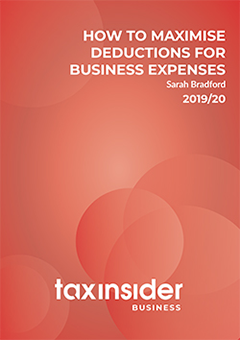The below excerpt is taken from our popular business report How to Maximise Deductions for Business Expenses.
As business entertainment is not deductible for tax purposes, it is necessary to add back any business entertainment expenses included in the accounts when preparing the tax computation.
To ensure that the correct amount is added back it is important to understand what counts as business entertaining.
The legislative definition is not particularly helpful, in that it defines entertainment as including hospitality of any kind but provides no further clarification as to what is entertainment or what is hospitality. However, case law has provided further insight as to what constitutes business entertainment and guidance as to the meaning can be found in HMRC’s Business Income Manual at BIM45000ff. The concept of a host/guest relationship is central to the meaning of business entertainment – the host provides the entertainment and the guest receives it.
It should also be noted that the disallowance extends to any incidental costs of providing the business entertainment, such as the cost of taxis to the venue.
Where business entertainment is provided, there will normally be an element of bounty. However, while business entertainment will often be provided free of charge to the recipient, this is not a necessary condition and subsidised entertainment will also count as business entertainment. For example, a business might spend £2,000 providing a social event for customers, who are charged £15 to attend, and 50 people attend, such that the net cost of £1,250 is regarded as business hospitality and is not deductible. However, if there is a contractual obligation to provide hospitality, as would be the case where food, drink and hospitality are provided as part of a package of services for which payment is made, a deduction is allowed. In this situation, the disallowance does not apply. Similarly, there is no disallowance where the hospitality is provided on a quid pro quo arrangement.
Business entertaining and hospitality may take various forms, ranging from the provision of drinks and snacks to more lavish meals, and will include events such as a day at the races or at a sporting fixture. Care must be taken with promotional events designed to publicise the promoter’s products. While a promotional event is not business entertainment, the costs of any food or drink or other hospitality provided as part of the event are not allowable.
9.3 Exceptions To The Rule – Allowable Entertaining Expenditure
Although as a general rule business entertaining expenses are not deductible in computing taxable profits, there are some exceptions to this rule. Consequently, there are some circumstances in which a deduction for entertainment expenditure is permitted.
The major exception is staff entertainment, which is allowable as long as it is incurred wholly, exclusively and necessarily for the purposes of the trade, provided that the entertainment of staff is not merely incidental to the provision of entertainment for customers. It is important here to note the additional condition that the entertainment must be ‘necessarily’ incurred as well as ‘wholly and exclusively’. For example, a staff lunch would be staff entertaining and would be allowable. However, if an employee takes a customer out for lunch, this would be classified as business entertainment and would be disallowed.
There is a further is a sting in the tail. Although staff entertainment is deductible in computing the taxable profits on the business, unless the entertainment is of a type covered by a particular exemption, such as that for Christmas parties and similar functions, the employee will suffer a benefit in kind charge on the provision of the entertainment.
Practical tip
To avoid falling foul of the rules on business entertainment, make sure adequate records are kept and that you don’t forget to add it back when doing the tax computation.
Want more tips? Order the full report here:





